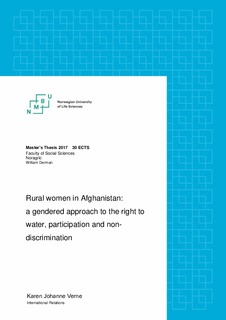| dc.description.abstract | Afghanistan is a fragile, war-ravaged and mostly semi-arid country in which water is scarce and droughts are common. In many of the country’s 32,000 rural villages, Afghan women bear the responsibility for the households’ water. However, accessing water is often arduous and time-consuming. The available water may not even be safe – diarrhea due to contaminated water is ubiquitous. Through a case study among women in two rural communities in Ashtarlai, Daikundi, the research has investigated the agency displayed by these women regarding water management. Moreover, the Afghan state’s fulfillment of these women’s human rights – to water, participation and non-discrimination - has been analyzed and assessed.
The research has revealed substantial differences regarding agency as well as access to water: In Kakrag, the Norwegian Church Alliance Afghanistan have implemented the Water, Sanitation and Hygiene (WASH) program, which apart from easy access to safe water has enabled the creation of transformative and inclusive institutions. As a consequence, gendered stereotypes have weakened and women’s equal participation in water management has increased significantly. In Dahane-Shalege, there has been no WASH program, the water situation is destitute, and the women display no signs of agency in water management.
The state of Afghanistan was found to have committed human rights violations by omissions, according to the International Covenant of Economic, Cultural and Social Rights (ICECSR): The right to water, participation, and equitability, but also the women’s right to health, livelihood, food, education, development and human dignity, even the right to life.
Human rights theories, the concepts of indivisibility and interrelatedness of rights, as well as agency theory have been useful when assessing the women’s situation regarding water, equitability and participation. The research has contributed to understanding of the necessity of inclusive institutions in equalizing economic, social and cultural differences. | nb_NO |

